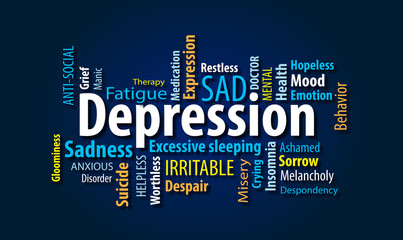

- Health Research
-
by Medprime Health
Depression is a complex and often misunderstood mental health disorder that affects millions of people worldwide. It can have a significant impact on a person’s quality of life, making it difficult to carry out daily activities, enjoy hobbies, and maintain healthy relationships. In this essay, we will explore what depression is, its causes, symptoms, and treatment options.
Depression is a mental health disorder characterized by a persistent feeling of sadness, hopelessness, or emptiness that lasts for weeks, months, or even years. It is not just a feeling of sadness but a medical condition that affects how a person thinks, feels, and behaves. Depression is a serious illness that can affect anyone, regardless of age, gender, or background.
The causes of depression are not fully understood, but a combination of biological, environmental, and psychological factors can contribute to its development. Biological factors such as genetics, brain chemistry, and hormones can make a person more susceptible to depression. Environmental factors such as stress, trauma, abuse, and major life changes can trigger or exacerbate depression. Psychological factors such as low self-esteem, negative thinking patterns, and a history of mental health disorders can also contribute to depression.
The symptoms of depression can vary in severity from person to person. The most common symptoms of depression include persistent feelings of sadness or hopelessness, loss of interest in activities, changes in appetite or weight, sleep disturbances, fatigue or loss of energy, feelings of worthlessness or guilt, difficulty concentrating or making decisions, and thoughts of death or suicide. These symptoms can interfere with daily activities, work, school, and relationships.

Treatment options for depression include psychotherapy, medication, and lifestyle changes. Psychotherapy, also known as talk therapy, involves working with a mental health professional to identify and change negative thinking patterns and behaviors that contribute to depression. Medications such as antidepressants can help relieve symptoms of depression by balancing brain chemicals that affect mood. Lifestyle changes such as regular exercise, healthy eating, getting enough sleep, and reducing stress can also help manage depression.

In addition to these treatment options, support from family, friends, and mental health professionals is essential for managing depression. It’s important to talk openly about depression, seek help when needed, and work with a mental health professional to develop a treatment plan that works for you.
In conclusion, depression is a serious mental health disorder that can have a significant impact on a person’s quality of life. While the causes of depression are not fully understood, treatment options such as psychotherapy, medication, and lifestyle changes can help manage symptoms and improve quality of life. It’s essential to seek help when needed, talk openly about depression, and work with a mental health professional to develop a treatment plan that works for you.

